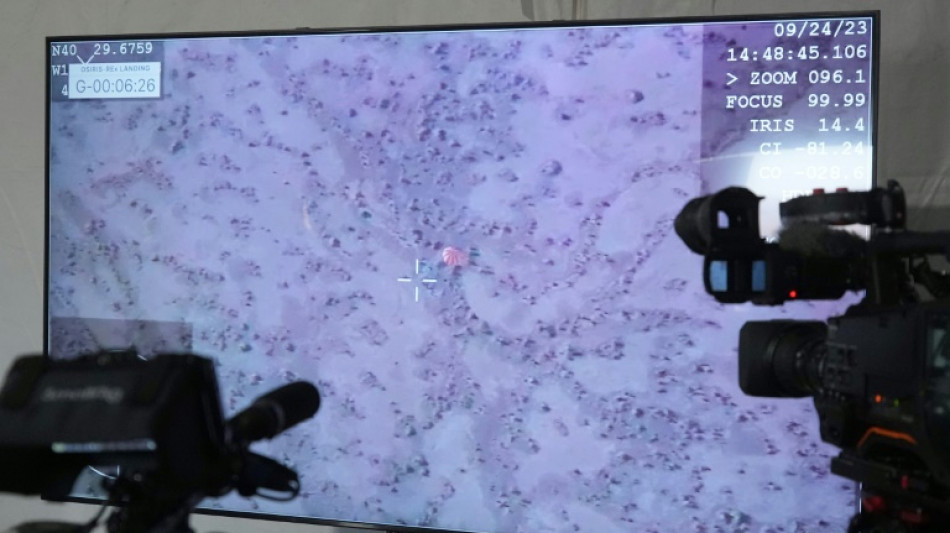
-
 Pietro Parolin, career diplomat leading race to be pope
Pietro Parolin, career diplomat leading race to be pope
-
Nuclear submarine deal lurks below surface of Australian election

-
 China's manufacturing shrinks in April as trade war bites
China's manufacturing shrinks in April as trade war bites
-
Financial markets may be the last guardrail on Trump

-
 Swedish journalist's trial opens in Turkey
Swedish journalist's trial opens in Turkey
-
Kiss says 'honour of a lifetime' to coach Wallabies at home World Cup

-
 US growth figure expected to make for tough reading for Trump
US growth figure expected to make for tough reading for Trump
-
Opposition leader confirmed winner of Trinidad elections

-
 Snedeker, Ogilvy to skipper Presidents Cup teams: PGA Tour
Snedeker, Ogilvy to skipper Presidents Cup teams: PGA Tour
-
Win or bust in Europa League for Amorim's Man Utd

-
 Trump celebrates 100 days in office with campaign-style rally
Trump celebrates 100 days in office with campaign-style rally
-
Top Cuban dissidents detained after court revokes parole

-
 Arteta urges Arsenal to deliver 'special' fightback against PSG
Arteta urges Arsenal to deliver 'special' fightback against PSG
-
Trump fires Kamala Harris's husband from Holocaust board

-
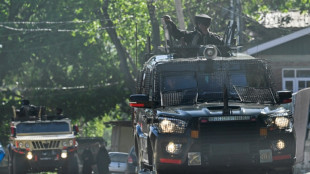 Pakistan says India planning strike as tensions soar over Kashmir attack
Pakistan says India planning strike as tensions soar over Kashmir attack
-
Weinstein sex attack accuser tells court he 'humiliated' her

-
 France accuses Russian military intelligence over cyberattacks
France accuses Russian military intelligence over cyberattacks
-
Global stocks mostly rise as Trump grants auto tariff relief

-
 Grand Vietnam parade 50 years after the fall of Saigon
Grand Vietnam parade 50 years after the fall of Saigon
-
Trump fires ex first gentleman Emhoff from Holocaust board

-
 PSG 'not getting carried away' despite holding edge against Arsenal
PSG 'not getting carried away' despite holding edge against Arsenal
-
Cuban dissidents detained after court revokes parole

-
 Sweden stunned by new deadly gun attack
Sweden stunned by new deadly gun attack
-
BRICS blast 'resurgence of protectionism' in Trump era
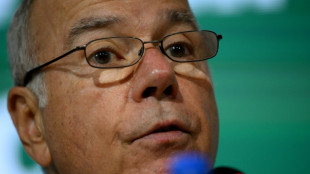
-
 Trump tempers auto tariffs, winning cautious praise from industry
Trump tempers auto tariffs, winning cautious praise from industry
-
'Cruel measure': Dominican crackdown on Haitian hospitals

-
 'It's only half-time': Defiant Raya says Arsenal can overturn PSG deficit
'It's only half-time': Defiant Raya says Arsenal can overturn PSG deficit
-
Dembele sinks Arsenal as PSG seize edge in Champions League semi-final

-
 Les Kiss to take over Wallabies coach role from mid-2026
Les Kiss to take over Wallabies coach role from mid-2026
-
Real Madrid's Rudiger, Mendy and Alaba out injured until end of season

-
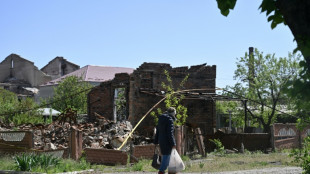 US threatens to quit Russia-Ukraine effort unless 'concrete proposals'
US threatens to quit Russia-Ukraine effort unless 'concrete proposals'
-
Meta releases standalone AI app, competing with ChatGPT
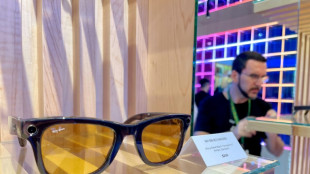
-
 Zverev crashes as Swiatek scrapes into Madrid Open quarter-finals
Zverev crashes as Swiatek scrapes into Madrid Open quarter-finals
-
BRICS members blast rise of 'trade protectionism'
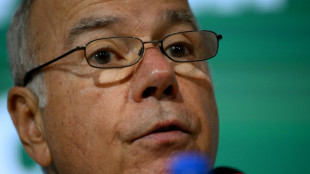
-
 Trump praises Bezos as Amazon denies plan to display tariff cost
Trump praises Bezos as Amazon denies plan to display tariff cost
-
France to tax small parcels from China amid tariff fallout fears

-
 Hong Kong releases former opposition lawmakers jailed for subversion
Hong Kong releases former opposition lawmakers jailed for subversion
-
Trump celebrates tumultuous 100 days in office

-
 Sweden gun attack leaves three dead
Sweden gun attack leaves three dead
-
Real Madrid's Rudiger banned for six matches after Copa final red

-
 Firmino, Toney fire Al Ahli into AFC Champions League final
Firmino, Toney fire Al Ahli into AFC Champions League final
-
Maximum respect for Barca but no fear: Inter's Inzaghi

-
 Trump signals relief on auto tariffs as industry awaits details
Trump signals relief on auto tariffs as industry awaits details
-
Cuban court revokes parole of two prominent dissidents

-
 Narine leads from the front as Kolkata trump Delhi in IPL
Narine leads from the front as Kolkata trump Delhi in IPL
-
Amazon says never planned to show tariff costs, after White House backlash

-
 Djokovic to miss Italian Open
Djokovic to miss Italian Open
-
Trossard starts for Arsenal in Champions League semi against PSG

-
 Sweden shooting kills three: police
Sweden shooting kills three: police
-
Real Madrid's Rudiger, Mendy out injured until end of season


Major asteroid sample brought to Earth in NASA first
A seven-year space voyage came to its climactic end Sunday when a NASA capsule landed in the desert in the US state of Utah, carrying to Earth the largest asteroid samples ever collected.
Scientists have high hopes for the sample, saying it will provide a better understanding of the formation of our solar system and how Earth became habitable.
"Touchdown of the Osiris-Rex sample return capsule!" a commentator said on NASA's live video webcast of the landing.
It completed a 3.86-billion-mile (6.21 billion-kilometer) journey. It marked "the US's first sample return mission of its kind and will open a time capsule to the beginnings of our solar system," the US space agency said in a post on X, the former Twitter.
The Osiris-Rex probe's final, fiery descent through Earth's atmosphere was perilous, but NASA managed to engineer a soft landing at 8:52 am local (1452 GMT), in the military's Utah Test and Training Range.
Four years after its 2016 launch, the probe had landed on the asteroid Bennu and collected roughly nine ounces (250 grams) of dust from its rocky surface.
Even that small amount, NASA says, should "help us better understand the types of asteroids that could threaten Earth" and cast light "on the earliest history of our solar system," NASA Administrator Bill Nelson said.
"This sample return is really historic," NASA scientist Amy Simon told AFP. "This is going to be the biggest sample we've brought back since the Apollo moon rocks" were returned to Earth.
Osiris-Rex released the capsule early Sunday -- from an altitude of more than 67,000 miles (108,000 kilometers) -- some four hours before it landed.
The fiery passage through the atmosphere came only in the last 13 minutes, as the capsule hurtled downward at a speed of more than 27,000 miles per hour, with temperatures of up to 5,000 Fahrenheit (2,760 Celsius).
Its rapid descent, monitored by army sensors, was supposed to be slowed by two successive parachutes as it made its way to the 37-mile by nine-mile landing zone.
The main chute, however, deployed "much higher than was originally anticipated," at about 20,000 feet rather than the planned 5,000 feet, the NASA commentator said.
NASA images showed the tire-sized capsule on the ground in a desert wash, with scientists approaching the device and taking readings.
Meanwhile, the probe that made the space journey fired its engines and shifted course away from Earth, NASA said, "on its way" for a date with another asteroid, known as Apophis.
Scientists predict that asteroid will come within 20,000 miles of Earth in 2029.
- Japanese samples -
The team will carefully airlift the device by helicopter to a temporary "clean room" nearby.
NASA wants this done quickly and carefully to avoid any contamination of the sample with desert sands, skewing test results.
On Monday the sample is to be flown by plane to NASA's Johnson Space Center in Houston. There, the box will be opened in another "clean room."
NASA plans to announce its first results at a news conference October 11.
Most of the sample will be conserved for study by future generations. Roughly one-fourth will be immediately used in experiments, and a small amount will be sent to mission partners Japan and Canada.
Japan had earlier given NASA a few grains from asteroid Ryugu, after bringing 0.2 ounces of dust to Earth in 2020 during the Hayabusa-2 mission. Ten years before, it had brought back a microscopic quantity from another asteroid.
But the sample from Bennu is much larger, allowing for significantly more testing, Simon said.
- Earth's origin story -
Asteroids are composed of the original materials of the solar system, dating back some 4.5 billion years, and have remained relatively intact.
They "can give us clues about how the solar system formed and evolved," said Osiris-Rex program executive Melissa Morris.
"It's our own origin story."
By striking Earth's surface, "we do believe asteroids and comets delivered organic material, potentially water, that helped life flourish here on Earth," Simon said.
Scientists believe Bennu, about 500 meters (1,640 feet) in diameter, is rich in carbon -- a building block of life on Earth -- and contains water molecules locked in minerals.
Bennu surprised scientists in 2020 when the probe, during its brief contact with the asteroid's surface, sank into the soil, revealing an unexpectedly low density, like a children's pool filled with plastic balls.
Understanding its composition could come in handy in the -- distant -- future.
For there is a slight, but non-zero, chance (one in 2,700) that Bennu could collide catastrophically with Earth, though not until 2182.
But NASA last year successfully deviated the course of an asteroid by crashing a probe into it in a test, and it might at some point need to repeat that exercise -- but with much higher stakes.
J.Oliveira--AMWN


